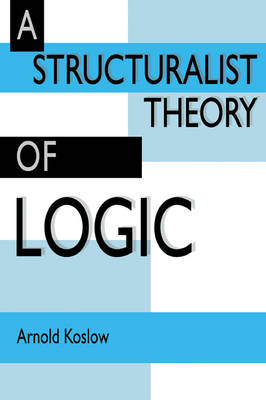
A Structuralist Theory of Logic
Cambridge University Press (Verlag)
978-0-521-02372-6 (ISBN)
In this 1992 book, Professor Koslow advances an account of the basic concepts of logic. A central feature of the theory is that it does not require the elements of logic to be based on a formal language. Rather, it uses a general notion of implication as a way of organizing the formal results of various systems of logic in a simple, but insightful way. The study has four parts. In the first two parts the various sources of the general concept of an implication structure and its forms are illustrated and explained. Part 3 defines the various logical operations and systematically explores their properties. A generalized account of extensionality and dual implication is given, and the extensionality of each of the operators, as well as the relation of negation and its dual, are given substantial treatment because of the novel results they yield. Part 4 considers modal operators and studies their interaction with logical operators. By obtaining the usual results without the usual assumptions this new approach allows one to give a very simple account of modal logic minus the excess baggage of possible world semantics.
Preface; Part I. Background: 1. Introduciton; 2. The program and its roots; 3. Introduction and elimination conditions in a general setting; 4. The Belnap program; Part II. Implication Relations: 5. The theory of implication relations; 6. Implications: variations and emendations; 7. Familiar implication relations: deducibility and logical consequence; 8. Implication relations: direct and derived; 9. Implications from implications; 10. Implication relations and the a priori: a further condition?; Part III. The Logical Operators: 11. Hypotheticals; 12. Negations; 13. Conjunctions; 14. The disjunction operator; 15. The logical operators parameterized; 16. Further features of the operators; 17. The dual of negation: classical and nonclassical implication structures; 18. The distinctness and relative power of the logical operators; 19. Extensionality; 20. Quantification; 21. Identity; 22. Special structures I. logical operators on individuals: mereology reconstituted; 23. Special structures II. interrogatives and implication relations; 24. Completeness; Part IV. The Modal Operators: 25. Introduction; 26. Modality; 27. Modals: existence and nonextensionality; 28. Special modals; 29. The possibility of necessity-style modals; 30. Modals revisited I; 31. Quantification and modality; 32. Modals revisited II; 33. Knowledge, truth, and modality; 34. The comparative strength of modals; 35. Kripke-style systematization of the modals without possible worlds; 36. Model functions, accessibility relations, and theories; 37. Migrant modals; Appendix; Notes; Bibliography; Index.
| Erscheint lt. Verlag | 17.11.2005 |
|---|---|
| Zusatzinfo | 15 Line drawings, unspecified |
| Verlagsort | Cambridge |
| Sprache | englisch |
| Maße | 157 x 203 mm |
| Gewicht | 665 g |
| Themenwelt | Geisteswissenschaften ► Philosophie ► Logik |
| ISBN-10 | 0-521-02372-6 / 0521023726 |
| ISBN-13 | 978-0-521-02372-6 / 9780521023726 |
| Zustand | Neuware |
| Haben Sie eine Frage zum Produkt? |
aus dem Bereich


